初二英语上册(外研版)Module 6 Animals in danger 知识点总结
- 格式:docx
- 大小:117.59 KB
- 文档页数:26
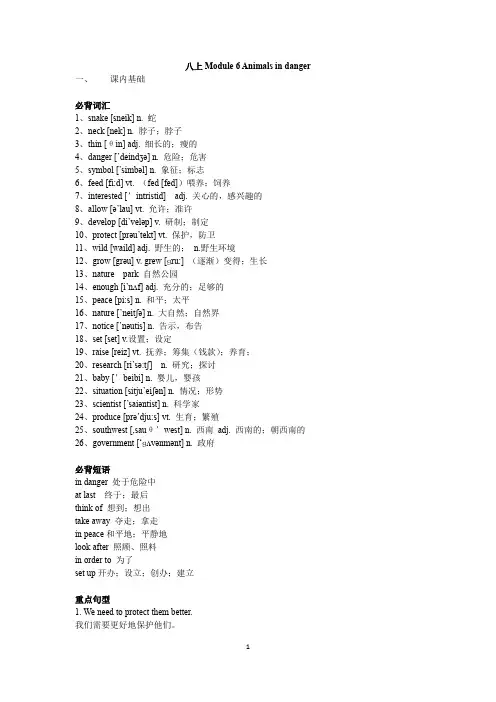
八上Module 6 Animals in danger 一、课内基础必背词汇1、snake [sneik] n. 蛇2、neck [nek] n. 脖子;脖子3、thin [θin] adj. 细长的;瘦的4、danger [’deindʒə] n. 危险;危害5、symbol [’simbəl] n. 象征;标志6、feed [fi:d] vt. (fed [fed])喂养;饲养7、interested [’intristid] adj. 关心的,感兴趣的8、allow [ə’lau] vt. 允许;准许9、develop [di’veləp] v. 研制;制定10、protect [prəu’tekt] vt. 保护,防卫11、wild [waild] adj. 野生的;n.野生环境12、grow [grəu] v. grew [ɡru:] (逐渐)变得;生长13、nature park 自然公园14、enough [i’nʌf] adj. 充分的;足够的15、peace [pi:s] n. 和平;太平16、nature [’neitʃə] n. 大自然;自然界17、notice [’nəutis] n. 告示,布告18、set [set] v.设置;设定19、raise [reiz] vt. 抚养;筹集(钱款);养育;20、research [ri’sə:tʃ] n. 研究;探讨21、baby [’beibi] n. 婴儿,婴孩22、situation [sitju’eiʃən] n. 情况;形势23、scientist [’saiəntist] n. 科学家24、produce [prə’dju:s] vt. 生育;繁殖25、southwest [,sauθ’west] n. 西南adj. 西南的;朝西南的26、government [‘ɡʌvənmənt] n. 政府必背短语in danger 处于危险中at last 终于;最后think of 想到;想出take away 夺走;拿走in peace和平地;平静地look after 照顾、照料in order to 为了set up开办;设立;创办;建立重点句型1. We need to protect them better.我们需要更好地保护他们。
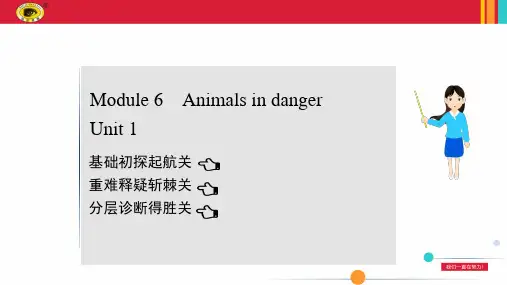
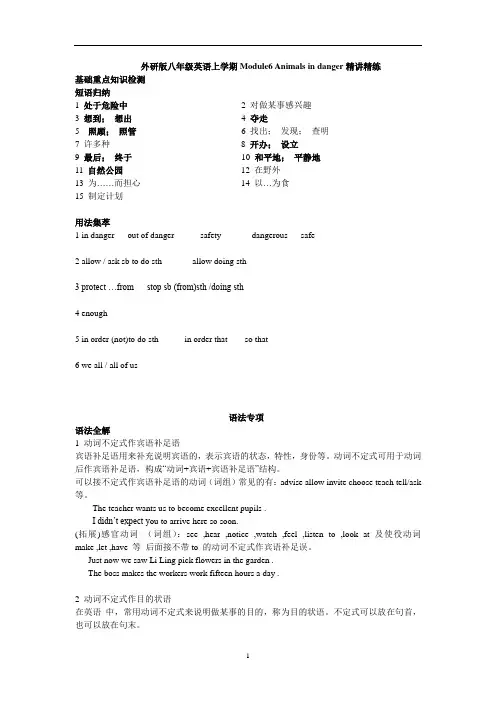
外研版八年级英语上学期Module6 Animals in danger精讲精练基础重点知识检测短语归纳1 处于危险中____________2 对做某事感兴趣______________3 想到;想出__________4 夺走__________________5 照顾;照管________________6 找出;发现;查明_________7 许多种________________ 8 开办;设立_________________9最后;终于______________ 10和平地;平静地__________11自然公园___________________ 12 在野外___________________13 为……而担心_____________ 14 以…为食__________________15 制定计划_________________用法集萃1 in danger out of danger safety dangerous safe2 allow / ask sb to do sth allow doing sth3 protect …from stop sb (from)sth /doing sth4 enough5 in order (not)to do sth in order that so that6 we all / all of us语法专项语法全解1 动词不定式作宾语补足语宾语补足语用来补充说明宾语的,表示宾语的状态,特性,身份等。
动词不定式可用于动词后作宾语补足语,构成“动词+宾语+宾语补足语”结构。
可以接不定式作宾语补足语的动词(词组)常见的有:advise allow invite choose teach tell/ask 等。
The teacher wants us to become excellent pupils .I didn’t expect y ou to arrive here so soon.(拓展)感官动词(词组):see ,hear ,notice ,watch ,feel ,listen to ,look at 及使役动词make ,let ,have 等后面接不带to 的动词不定式作宾语补足误。
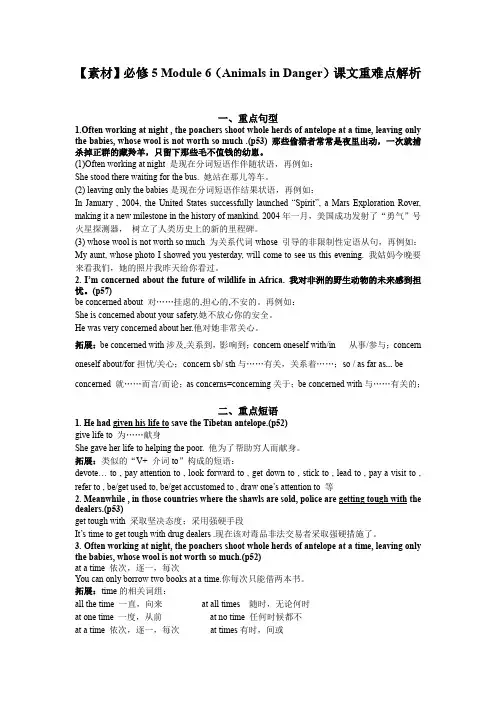
【素材】必修5 Module 6(Animals in Danger)课文重难点解析一、重点句型1.Often working at night , the poachers shoot whole herds of antelope at a time, leaving only the babies, whose wool is not worth so much .(p53) 那些偷猎者常常是夜里出动,一次就捕杀掉正群的藏羚羊,只留下那些毛不值钱的幼崽。
(1)Often working at night 是现在分词短语作伴随状语,再例如:She stood there waiting for the bus. 她站在那儿等车。
(2) leaving only the babies是现在分词短语作结果状语,再例如:In January , 2004, the United States successfully launched “Spirit”, a Mars Exploration Rover, making it a new milestone in the history of mankind. 2004年一月,美国成功发射了“勇气”号火星探测器,树立了人类历史上的新的里程碑。
(3) whose wool is not worth so much 为关系代词whose 引导的非限制性定语从句,再例如:My aunt, whose photo I showed you yesterday, will come to see us this evening. 我姑妈今晚要来看我们,她的照片我昨天给你看过。
2. I’m concerned about the future of wildlife in Africa. 我对非洲的野生动物的未来感到担忧。
(p57)be concerned about 对……挂虑的,担心的,不安的。
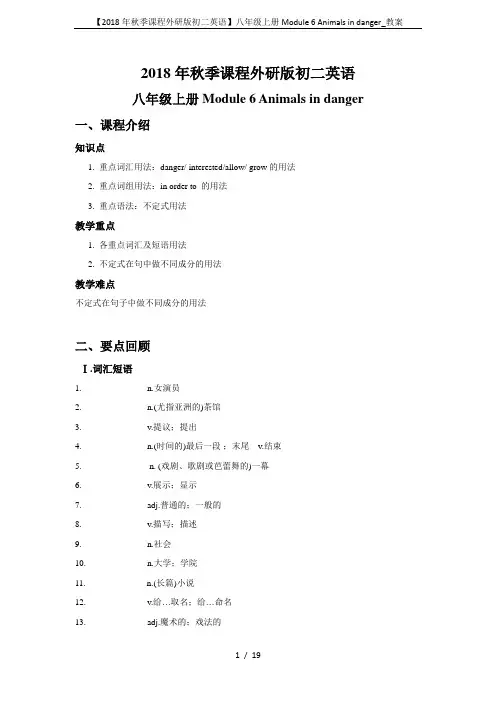
2018年秋季课程外研版初二英语八年级上册Module 6 Animals in danger 一、课程介绍知识点1. 重点词汇用法:danger/ interested/allow/ grow的用法2. 重点词组用法:in order to 的用法3. 重点语法:不定式用法教学重点1. 各重点词汇及短语用法2. 不定式在句中做不同成分的用法教学难点不定式在句子中做不同成分的用法二、要点回顾Ⅰ.词汇短语1._____________ n.女演员2._____________ n.(尤指亚洲的)茶馆3._____________ v.提议;提出4._____________ n.(时间的)最后一段;末尾v.结束5._____________ n. (戏剧、歌剧或芭蕾舞的)一幕6._____________ v.展示;显示7._____________ adj.普通的;一般的8._____________ v.描写;描述9.____________ n.社会10.____________ n.大学;学院11.____________ n.(长篇)小说12.____________ v.给…取名;给…命名13.____________ adj.魔术的;戏法的14._____________________ offer to do sth.15.______________________ in the end16.______________________ hope to do sth.17.______________________ the twentieth century18.______________________ give a warm welcome19.______________________ all over the world【答案】1.actress2.teahouse3.offer4.end5.act6.show mon8.describe 9. society 10.college 11.novel 13.Magic 14.主动提出做某事15.最后16. 希望去做某事17. 20世纪18. 热烈欢迎19.全世界Ⅱ.活用句型翻译下列句子1. 我们本来计划只看一个小时,但最后我们待了三个小时。
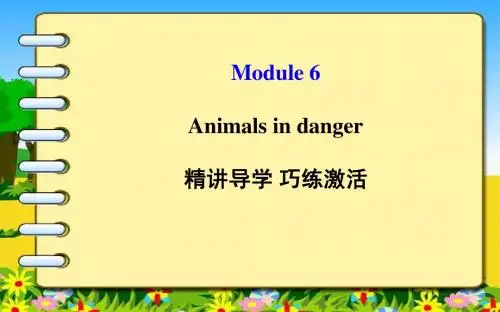
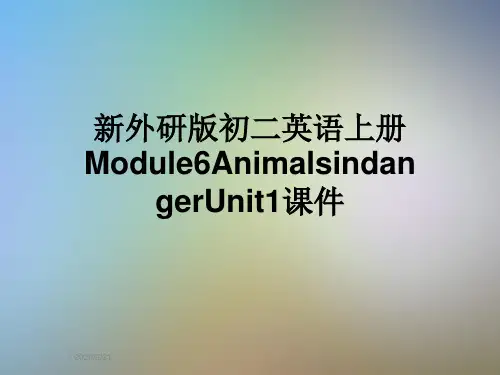
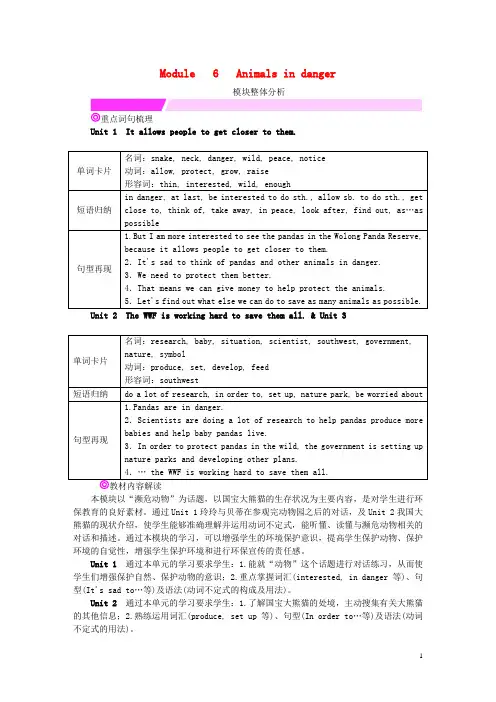
Module 6 Animals in danger模块整体分析Unit 1It allows people to get closer to them.本模块以“濒危动物”为话题,以国宝大熊猫的生存状况为主要内容,是对学生进行环保教育的良好素材。
通过Unit 1玲玲与贝蒂在参观完动物园之后的对话,及Unit 2我国大熊猫的现状介绍,使学生能够准确理解并运用动词不定式,能听懂、读懂与濒危动物相关的对话和描述。
通过本模块的学习,可以增强学生的环境保护意识,提高学生保护动物、保护环境的自觉性,增强学生保护环境和进行环保宣传的责任感。
Unit 1通过本单元的学习要求学生:1.能就“动物”这个话题进行对话练习,从而使学生们增强保护自然、保护动物的意识;2.重点掌握词汇(interested, in danger等)、句型(It's sad to…等)及语法(动词不定式的构成及用法)。
Unit 2通过本单元的学习要求学生:1.了解国宝大熊猫的处境,主动搜集有关大熊猫的其他信息;2.熟练运用词汇(produce, set up等)、句型(In order to…等)及语法(动词不定式的用法)。
Unit 3通过本单元的练习要求学生:1.进一步学习动词不定式的用法;2.能就“处于困境中的动物”这个话题进行讨论,能熟练表达自己的想法。
1.I saw the pandas at last!2.We need to protect them better.3.Also, often there isn't enough clean water.4.Look, there's a notice.5.Help! We want to save animals in danger…6.But what can we do?7.Maybe we can raise some money at school.8.L et's find out what else we can do to…9.The bamboo forests are getting smaller, so pandas are losing their home.10.In order to protect pandas in the wild…1.动词不定式(二)。
初二英语上册(外研版)Module 6 Animals in danger知识点总结一、重点词汇thin·原文再现I am long and thin.我又长又瘦。
·基本用法thin adj. 瘦的,薄的He was a tall, thin man with grey hair.他是个瘦高个,头发灰白。
The ice is too thin to bear your weight.冰太薄,承受不了你们的重量。
·知识拓展--反义词thick adj. 厚的fat adj. 胖的You must be very hot in that thick sweater.你穿著那件厚毛衣一定很热吧。
I could eat what I liked without getting fat.我可以吃我喜欢的东西而不发胖。
danger·原文再现But it’s sad to think of the pandas and other animals in danger.但是想起大熊猫和其它濒危动物来,真让人伤心。
·基本用法danger n. 危险,危险物Regardless of danger, he climbed the tower.他不顾危险地爬上了高塔。
in danger 处于险境,处于危险之中The girl is very ill and her life is in danger.女孩病的很重,生命垂危。
·知识拓展--相关单词dangerous adj. 危险的,有危险的I kept my friend back from the dangerous animal.我不让我的朋友靠近那个危险的动物。
at last·原文再现I saw the panda at last.我终于看到熊猫了。
·基本用法at last 终于,最后At last the wild wind calmed down.狂风终于停了下来。
·知识拓展--相关短语At last = in the end =finallyHe calmed down in the end.他的情绪终于平定下来。
We finally arrived in Rome.我们终于到达罗马。
interested·原文再现But I am more interested to see the pandas in the Wolong Panda Reserve. 但是我更感兴趣的是去看卧龙大熊猫保护区里的熊猫。
·基本用法be interested to do sth. 对做…感兴趣I am interested to read more about Steven Jobs’ life.我对读更多有关史蒂夫.乔布斯的东西感兴趣。
be more interested to do sth. 对做…更感兴趣,为比较级结构·知识拓展--相关短语be interested in sth. 对…感兴趣I came to Istanbul because I am interested in the history of the city.我来到伊斯坦布尔因为我对这个城市的历史感兴趣。
allow·原文再现..., because it allows people to get closer to them.…,因为这使人更加接近他们。
·基本用法allow vt. 允许,承认(过去式:allowed 过去分词:allowed 现在分词:allowing 三单:allows)其用法如下:1. allow sb to do sth : 允许某人做…They allow visitors to take photos here.他们不允许游客在此拍照。
His mother allows him to watch TV after finishing his homework.他妈妈允许他做完作业后看电视。
2. allow doing sth: 允许做..They don’t allow smoking here.他们不允许在这人吸烟。
think of·原文再现It’s sad to think of pandas and other animals in danger.想起大熊猫和其它濒危动物来,真让人伤心。
·基本用法think of 想到,想出I can't think of a better place for our party.我想不出一个更好的聚会的地方。
I wonder who first thought of the idea.我纳闷谁先想到这个主意的。
·知识拓展--词义辨析:think 词组1. think about 考虑,思考,着重于想的过程We will think about your suggestion.我们会考虑你的建议。
She thought a lot about how to spend this winter vacation.她想了很多,该怎么过这个寒假。
2. think of “想起、记起;有…想法、看法;对…有意见;考虑”Will you think of me after I've left?我离开后,你还会记着我吗?protect·原文再现We need to protect them better.我们需要更好地保护他们。
·基本用法protect vt.保护,保卫(过去式:protected 过去分词:protected 现在分词:protecting三单:protects)We have to protect our employees.我们必须保护员工。
常用于“protect sb/sth from sth/doing sth”的结构中,意为:保护某人/某事,免受…An umbrella will protect you from the rain.雨伞可以保护你不至于淋雨。
Trees should be well protected from the cold during winter.冬天要保护好树木以防冻坏。
·知识拓展--相关单词protection n. 保护,保卫Wear clothes that provide adequate protection against the wind and rain.穿上足以防风雨的衣服。
wild·原文再现Many wild animals don’t have a safe place to live in.很多动物没有安全的栖息地。
·基本用法1. wild adj. 野生的;野蛮的We saw two more wild cats creeping towards us in the darkness...我们看见又有两只野猫在黑暗中悄悄向我们靠近。
wild animals 野生动物2. wild n. 野生环境in the wild 在野外But what about how the animals play in the wild?但是野生环境下的动物是怎么玩耍的呢?grow·原文再现Many wild animals don’t have a safe place to live, because villages and farms are growing bigger and biggerand are taking away their land and forests.很多野生动物没有安全的栖息地,因为乡村和农场变得越来越大,夺走了他们的土地和森林。
·基本用法grow 做实义动词,意为“生长,成长”(过去式:grew过去分词:grown 现在分词:growing 三单:grows)Does this plant grow in cold countries or in hot countries?这种植物生长在寒带还是热带?在本句话中,grow为系动词,意为“变得”He's growing old.他渐渐变老了。
·知识拓展其他常见的一些系动词1. 状态系动词,只有be一词,例如:He is a teacher. 他是一名教师。
(is与补足语一起说明主语的身份。
)2. 持续系动词:用来表示主语继续或保持一种状况或态度,主要有keep, rest, remain, stay, lie, stand, 例如:He always kept silent at meeting.他开会时总保持沉默。
This matter rests a mystery.此事仍是一个谜。
3. 表像系动词:用来表示"看起来像"这一概念,主要有seem, appear, look, 例如:He looks tired.他看起来很累。
He seems (to be) very sad.他看起来很伤心。
4. 感官系动词:感官系动词主要有feel, smell, sound, taste, 例如:This kind of cloth feels very soft.这种布手感很软。
This flower smells very sweet.这朵花闻起来很香。
5. 变化系动词:表示主语变成什么样,变化系动词主要有become, grow, turn, fall, get, go, come, run.He became mad after that.自那之后,他疯了。
She grew rich within a short time.她没多长时间就富了。
take away·原文再现Man y wild animals don’t have a safe place to live, because villages and farms are growing bigger and biggerand are taking away their land and forests.很多野生动物没有安全的栖息地,因为乡村和农场变得越来越大,夺走了他们的土地和森林。
·基本用法take away 带走,拿走,取走Take away the glasses and the tray.把这些玻璃杯和托盘拿走。
The poor parents had to take their son away from school.穷困的父母不得不让儿子辍学。